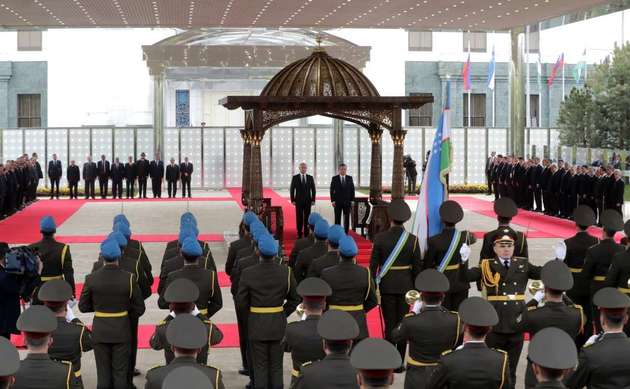Four years ago, the death of Islam Karimov, who ruled Uzbekistan for 27 years, sparked a lot of rumors and speculations about the transit of power and changes that would take place in the country. Despite fears of possible public unrest and political clashes, the transition of power went surprisingly smoothly, and the reforms of the new president, Shavkat Mirziyoyev, brought the state to a new level.
Not by cotton alone
From the first days of his presidency, Mirziyoyev headed towards reforms and openness. In 2017, a five-year state development strategy was approved with the emphasis on business liberalization and attracting foreign investment for the development of various sectors. Before, when mentioning Uzbekistan, the first thing that came to mind was cotton, now this analogy is irrelevant. Today, Uzbekistan exports its goods to 42 countries, 59 products were sent abroad for the first time in 2019.
Within the framework of the Strategy for the Development of Agriculture of the Republic of Uzbekistan for 2020-2030, a program is being implemented to create a favorable climate for doing agribusiness. A cluster system has been organized, allowing the rational use of lands, increasing yields and diversifying the crops grown. In cooperation with Russian and Chinese colleagues, Uzbekistan is creating a research base for the further development of agriculture; international organizations provide loans for the implementation of the Uzbek government’s programs.
In addition to the significant reconstruction of the agricultural sector, Uzbekistan intends to become the world leader in gold production. The government is attracting foreign companies and investors to develop the industry and intends to increase the gold reserve to 474 tons worth $18.75 bln over the next five years
In addition, Uzbekistan has begun the development of the digital economy. Since 2018, blockchain technology has been developing in the country; the Digital Trust was created to attract investors and implement projects. In January 2020, the South Korean company Kobea Group opened in Uzbekistan the first crypto exchange in the Central Asian region - Uznex. At the moment, the crypto-turnover in the country is exempt from taxation.
Opening borders
Four years ago, Uzbekistan was one of the most closed countries in the world, but in April 2017, Mirziyoyev canceled the visa regime for citizens of Australia, Austria, Great Britain, Germany, Denmark, Spain, Italy, Canada, Luxembourg, Netherlands, Republic of Korea, Singapore, Finland, Switzerland and Japan entering the country for 30 days. In February 2019, 45 more countries were added to this list, while the procedure for issuing tourist visas for citizens of 39 countries was simplified, electronic visas were introduced as well. Starting in 2020, citizens of Uzbekistan, who were practically restricted to travel abroad, can visit 58 countries without a preliminary visa application.
By liberalizing the visa regime, Uzbekistan seeks to develop a promising tourism sector, including both active recreation and travel of a cultural and educational nature. As a result of the visa reform, the number of tourists increased from 240 000 in 2005 to 6.7 mln in 2019. In addition to the simplified procedure for obtaining visas, the government is actively involved in the development of transport infrastructure, promotion of certain types of tourism, as well as attracting foreign investment.
Friendly Uzbekistan
During the reign of Islam Karimov, Uzbekistan's foreign policy can generally be characterized as protectionist, as a result of which relations with neighboring states - Tajikistan, Kyrgyzstan and Kazakhstan - were cool at best. Favorable trade and economic relations were maintained with Russia, but Eurasian integration clearly was not part of Karimov's plans. Moreover, Uzbekistan twice withdrew from the Collective Security Treaty.
However, since 2016 the situation has changed dramatically. Shavkat Mirziyoyev took a course of good-neighborliness and adheres to it so far. Relations with the Central Asian countries are developing in such areas as security, investment, culture and ecology. By the end of 2019, trade with Kazakhstan, Turkmenistan, Tajikistan and Kyrgyzstan increased to $5.2 bln. Delimitation and demarcation of state borders with Kyrgyzstan and Tajikistan was implemented, issues of water use and transport corridors are being actively discussed.
Relations with Russia have also reached a qualitatively new level - multi-billion dollar contracts have been signed in various sectors, the countries have become strategic partners and allies, and inter-parliamentary dialogue has been established, and active negotiations are underway on Uzbekistan's accession to the EAEU. Russia has become one of the country's largest investment partners.
The changes in Uzbekistan over the past four are recognized at the international level both for economic liberalization and in the field of human rights. In 2019, The Economist magazine named Uzbekistan The Country of the Year in terms of implementation of the planned reforms, and in 2020, the Central Asian state for the first time since 2016 was included in the Global Innovation Index, improving its results in such categories as Market Development, Infrastructure and Human Capital and Research. According to Foreign Minister Abdulaziz Kamilov, Uzbekistan may become one of the 50 economically developed countries by 2035.






